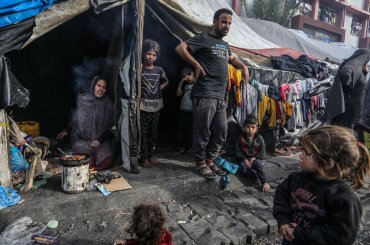Gershom Gorenberg has a new book out, The Unmaking of Israel. Below I offer (first, to be fair) his argument against the one-state resolution of the conflict favored by so many on this site and (second) my mini-review from leafing through the book.
1) Gorenberg’s argument against the one-state answer begins with the assertion that progressives are fighting “the last battle,” South Africa. But this answer won’t work in “Israel.” He continues:
In fact, a one-state arrangement would solve little and make many things worse. Imagine that tomorrow Israel, the West Bank, and the Gaza Strip are reconstituted as the Eastern Mediterranean Republic, and elections are held. With the current population, the parliament will be split almost evenly between Jews and Palestinians. One of the first issues that the parliament and judiciary will face is the settlements that Israel built on privately owned Palestinian property, whether it was requisitioned, stolen, or declared state land over Palestinian objections Palestinian claimants will demand return of their property. The problem of evacuating settlers won’t vanish. Rather, it wil divide the new state on communal grounds.
Gorenberg says the same divide will occur over return of Palestinian refugees. Jews will oppose it. Palestinians will demand return of property “lost in 1948 and perhaps the rebuilding of destroyed villages. Except for the drawing of borders, virtually every question that bedevils Israel-Palestinian peace negotiations will become a domestic problem setting the new political entity aflame.”
The Palestinian and Israeli communities are also very unequal economically, he says; and when the economies are combined, Jews will be required to pay higher taxes and “individuals and companies will leave, crippling the new shared economy.”
There would be separate Palestinian and Israeli political parties, and no one would be able to bridge the ethnic divide. Writes Gorenberg, who calls this imagined new country “Israel”:
“Israel would become a second Belgium, perpetually incapable of forming a stable government. In the more likely case, the political tensions owuld ignite as violence. The transition to a single state would mark a new stage in the conflict.”
Israel might well become Lebanon, he says.
“It would be a nightmare: another of the places marked on the globe as a country in which two or more communities do battle while the most educated or well-connected members of each look for refuge elsewhere.”
2, My response after skimming the book:
Many Israeli Jews are proudly ethnocentric. They would say that the Jews built a society here and we have our narrative and the Arabs have their narrative, but I can really only tell you ours, and Gershom Gorenberg is in that group. He is an Israeli by choice, as he announces. He moved from the United States to Israel as a youth for a reason, and he doesn’t look back. He says that Israel must provide refuge for “people persecuted as Jews… [any] where in the world.” His children have Hebrew names, and he seems to love a place “where the public arena is largely Jewish” and– this is interesting– “where the standards of physical beauty are shaped by how Jews look.”
Such a narrator is pointedly not worldly. Gorenberg is not interested in the new global political movement about Palestine, though he is aware of it; he fears that Israel could become a “pariah” state internationally. He’s not interested really in Palestinian society or politics. Mahmoud Abbas and boycott don’t show up in the index. He has interviewed a few Palestinians for this book, but they don’t show up much either. He doesn’t seem to care at all about American Jewish politics. Barack Obama isn’t in the index, even though Gorenberg is trying to save the two state solution.
He seems to believe this is an inside-Israeli challenge. He is engaged here as an Israeli with what Israel is doing to itself. He is worried that Israel has become Pakistan, whereas it should be the United States of the civil war and the civil rights movement. He fears that the religious have taken over the public culture and the settlers have taken over the politics. So this book is about being a liberal Zionist in crisis, the crisis of Israel’s soul.
The blinders are sometimes disturbing. Cast Lead, that monstrous onslaught that precipitated so much international criticism of Israel, only really figures in this account because of the ways that Israelis talked about it—“The IDF’s behavior in Gaza, especially toward Palestinan civilians, was intensely controversial—not just abroad but within Israel,” he writes. Then for a few pages, Gorenberg describes that Israeli controversy: rightwing objections that Israeli soldiers were commanded to bend over backwards to protect Palestinian civilians.
He does not ever mention that 1400 Palestinians were killed in 3 weeks, more than 300 of them children. Even Gaddafyi wasn’t that efficient. He never says that his government dropped white phosphorus on children. I guess Israelis didn’t talk about that. I don’t think Gorenberg has a clue how bad things are in the occupation.
He does not count the 250,000 or so Israeli settlers of East Jerusalem as settlers. He says Jerusalem was annexed. Full stop.
It ought to be curious that such a nonworldy perspective is so prominent inside the American discourse, but then Gorenberg has earned high status for writing well about Israeli Jewish culture and politics, and he has had a good ride in recent years. The American Prospect, which I guess is liberal Zionist, anointed him a guide on the issue. He’s been promoted by Fresh Air, the New York Review of Books, and Columbia University. Michael Chabon blurbs this book as a hopeful one.
Still, I wonder how helpful such a doggedly-I’m-an-Israeli-inside-Israel focus is. When he says that the Palestinian desire to move back into their villages in Israel and make one country between the river and the sea is as preposterous as Algerians claiming not just Algeria in the 1960s but France too– “Unlike Palestinians, Algerian nationalists did not claim France as part of their birthright”– that is nutty. Many of those Palestinians were born in what is now Israel and have been denied the right to return to their homes. Wikipedia says that Gorenberg was born in St. Louis, Missouri. He seems to believe that Israel really always was the homeland of the Jews, even when they were outnumbered in the place 18 to 1. And that’s the way it’s always going to be.
His ideas on how to bring about the two state solution aren’t original: you’ve read them before. The settlers have to move, to save Israel’s soul. Israel can do it and also secularize its public space. Just as America had to have the civil war to save itself from slavery. (Well the civil war was a huge bloodletting…)
The most interesting part of the book is Gorenberg’s argument against the one state solution, above. I think Gorenberg ought to debate Ali Abnimah or Udi Aloni. Maybe we could make that happen?



Thanks for writing about his book at some length.
He’s talking to the same audience that you originally claimed to be speaking to, until you morphed into the partisan BDS theme.
He has an extended debate at 972 with Dimi Reider from October
http://972mag.com/bloggingheads-dimi-reider-vs-gershom-gorenberg-1-state-or-2/24642/
The single state is currently an imposition, not consented by any majority.
It may be argued for as a concept, but there are long-term substantive contradictions between a democratic approach and sentiment and the single state, resulting from its imposition onto communities that don’t regard themselves as one nation, but two.
The tracing of possible consequences to that fundamental contradiction are guesses on his part, and to criticize those guesses as the substance of his argument rather than the argument itself is a deflection.
Israel is in potentially better status than Lebanon as although there considerable interaction of the Arab and various Jewish communities in Israel, there is none in the West Bank. The two communities are not in a forced intimacy. They are still basically separate communities, and have the potential to form into two states, if there are willing parties to do so. (Netanyahu administration is not that currently.)
At 20% minority population, there is critical mass for acceptance. At 5% minority status, there is too much urge to “purify” the state.
Maybe you are arguing that the Palestinian prospect of removing all Jews from the West Bank is the evil that you are thinking to avoid. I don’t hear it.
Gorenberg is definitely a liberal Zionist, seeking to preserve the Jewish state that attracted him, and reform to realize the features of Jewish in association and in values (including the universalistic ones that appeal to the logic of one-state).
Gorenberg has spoken personally of his sense of inevitability of a confederated region, comprised of two distinct nation-states but with such close inter-personal, diplomatic, economic, ecological interaction that there is full freedom of movement, even residence between the two.
The single state proposal CONFLICTS with the proposal to required Jewish residents east of the green line to be moved forcibly.
IF there is developed cosmopolitan, non-nationalist, parties say 99% parties, in both Israel and Palestine, then there may be an electoral path to integration, rather than the imposed revolutionary path.
He says the settlers have to move, to save Israel’s soul. This means that they have to move voluntarily (the Jewish people of Israel must decide, voluntarily for their own Jewish reasons, to move AWAY from settlements and occupation and war).
Wouldn’t that be nice?
Because those very Israeli Jews have for 44 years been accelerating their movement TOWARD settlements, occupation, wall, siege, and war — I perceive that they must move AWAY (as he says) but because of a reaction to EXTERNAL pressures. That’s what BDS is for. That’s what PLO/PA’s UN maneuvers are for. That’s what Mondoweiss is for.
“and when the economies are combined”
They are already combined FFS. They have the same currency. Israel controls everything. Customs, road passages, electricity, water, exports, everything.
Israel is already South Africa. If Israel became Lebanon it would have a decent food culture. Most unlikely.
‘He fears that the religious have taken over the public culture and the settlers have taken over the politics. ”
Israel has 7 emerging crises all converging – neoliberal inequality, the Orthodox, where will economic growth come from, regional isolation, the end of the holocaust free pass, the settlers and apartheid. None of these are being addressed. It is going to explode.
From what you say about him he sounds like a jerk (more precisely, a narcissistic Israeli pseudo-liberal). However, that doesn’t mean his arguments against the one state solution are wrong. I’d like to see a serious discussion/debate on this subject between people who know both the Palestinians and the Israelis really well.